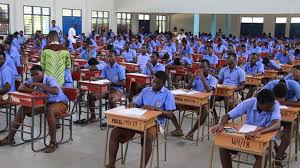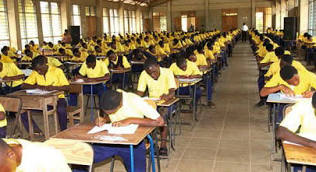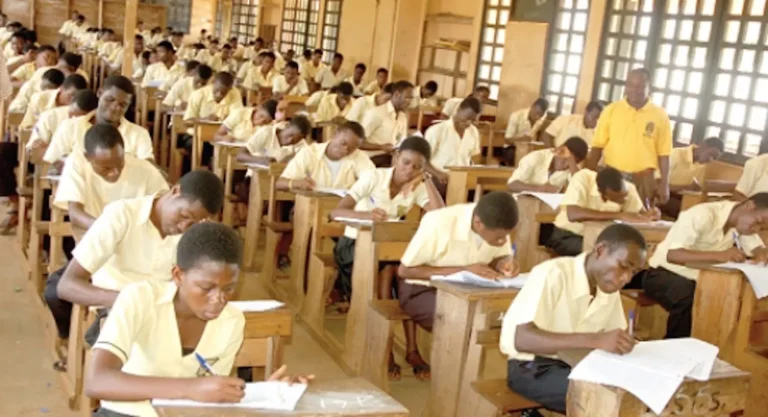The West African Examinations Council (WAEC) announced on Monday the release of the results of the 2025 West African Senior School Certificate Examinations (WASSCE) for school-based candidates, recording the worst performance in many years.
The development may not be unconnected to the logistics problem encountered by the examination body during the conduct of the examination in May, when students were kept at centres late into the night.
WAEC said a total of 1,973,365 candidates registered for the examinations across 23,554 secondary schools in the country, but 1,969,313 sat the examinations.
The Head of Nigeria’s Office (HNO) of WAEC, Amos Dangut, who disclosed this during a media briefing at the examination body’s headquarters in Lagos, said out of the 1,969,313 candidates who sat the examination, only 754,545 candidates, representing 38.32 per cent, secured credits and above in a minimum of five subjects, including English Language and Mathematics.

Head of Nigeria’s Office (HNO) of WAEC, Amos Dangut
In Nigeria, to be eligible for admission into tertiary institutions, obtaining credits in five relevant subjects, including English and Mathematics, in Senior School Certificate Examinations (SSCE), is mandatory.
Out of the 754,545 candidates who secured credits in five subjects, including English Language and Mathematics, WAEC said 347,192, representing 46.01 per cent, are males, while 407,353, representing 53.99 per cent, are females.
Worse performance
The 38.32 per cent performance ranked very poorly when compared to the performances recorded some years back. It is even worse than what was recorded during the COVID-19 pandemic, when stakeholders had feared mass failure due to the lockdown experienced globally. During the period, schools were shut for many months, leading to the extension of dates for the conduct of WASSCE in 2020.
READ ALSO: WASSCE 2025: WAEC set to release results, hope rises for admission seekers
When the results were released in November 2020, WAEC said 65.24 per cent of candidates who took part in the examinations secured credits in five subjects, including English Language and Mathematics. It was even a better performance than in 2019, when 64.18 per cent of the candidates secured a similar pass rate.
In 2023, WAEC said a total of 79.81 per cent of its candidates obtained credits in five subjects, including English and Mathematics, while in 2014 it was 72.12 per cent.
Speaking on the poor performance, Mr Dangut said, “A comparison of the percentage of candidates in this category in WASSCE for School 2024 and 2025, reveal that in this year’s (2025) WASSCE, there is 33.8 per cent decrease in performance (that is, those who obtained credit and above in a minimum of five subjects, including English Language and Mathematics, was 72.12 per cent.”

Meanwhile, WAEC said the examination was also administered to candidates from some schools in Benin Republic, Cote d’Ivoire, and Equatorial Guinea, where it noted the Nigerian curriculum for senior secondary schools is being used.
451,796 candidates have no complete results yet
Meanwhile, WAEC said a total of 451,796 candidates, representing 22.94 per cent “have one or more of their subjects still being processed due to some issues to be resolved.”
The WAEC boss, however, noted that efforts are being made to “speedily complete the processes to enhance the release of results of the affected candidates “within a couple of days.”
Withheld results
According to the WAEC boss, a total of 192,089 candidates, representing 9.75 per cent of the total number of candidates that sat the examination, have their results being withheld “in connection with various reported cases of examination malpractice.”
Mr Dangut said the percentage of the candidates with similar fate in 2024 stood at 11.92, and 2.1 per cent higher than what the examination body recorded in 2025.
READ ALSO: We don’t withhold results without reason — WAEC
He blamed the development on the increasing use of cell phones in the examination hall by candidates despite the existing ban, and what he described as organised cheating in some schools.
Mr Dangut lamented the activities of those he described as operators of rogue websites and examination malpractice syndicates, even as he condemned the involvement of a few supervisors conniving with these perpetrators to cheat the system.

He said: “These unscrupulous elements have become a ‘thorn in the Council’s flesh. They have even become more brazen in their activities, to the extent that they compose fake messages in the name of the Council to wreak havoc and cause distress for unsuspecting stakeholders. The Council is calling on all stakeholders to help in the fight against these individuals and to raise awareness about their deceptive antics.
“Nonetheless, the Council, through its collaborative efforts with security operatives, was able to apprehend some of these individuals. They are already having a taste of their pudding. All supervisors and invigilators who were caught aiding and abetting examination malpractice were also brought to book. The Council, on its part, through the Nigeria Examinations Committee (NEC), will mete out appropriate sanctions to affected supervisors in collaboration with the various states’ ministries of education.”
Mr Dangut noted that all the cases of examination malpractice recorded during the conduct of the examination are being investigated, noting that reports of the investigations will be presented to the appropriate committee of WAEC for consideration and final decisions.
“The Committee’s decisions will be communicated to the affected candidates through their various schools, in due course. Candidates affected by these decisions can now call for redress of their malpractice cases if they so wish via https://waecinternational.org/complaints”
Further breakdown
According to WAEC, out of the 1,973,365 candidates who sat the examinations, 976,787, amounting to 49.60 per cent were males, while 992,526, amounting to 60.40 per cent were females.
Mr Dangut said a total of 12,178 candidates were with varying degrees of special needs, with 112 visually impaired, 615 had impaired hearing, 52 with spastic and mental challenges, and 37 were physically challenged.
Results available in 12 hours, certificates in 48 hours
Meanwhile, the examination body has said the results are currently being uploaded online, and that after candidates have checked their results, their digital certificates will be available for collection within 48 hours.
“Candidates who have fulfilled their financial obligations to the Council can access their results on the Council’s results website: www.waecdirect.org, within the next twelve hours. Copies of the Result Listing will be sent to schools shortly,” Mr Dangut said.
He, however, added that the results of candidates sponsored by some state governments but which are indebted to WAEC “will not be released now until payment is made.”
He appealed to the concerned states to pay up so that their candidates can access their results.

